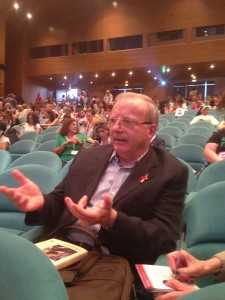 Sanit, the International Health Forum, this year has witnessed a very special participation by the Order of the Ministers of the Sick. One of the speakers of the first day of the proceedings, Tuesday 18 June, which was centred around the ethics of professional conduct, was Fr. Germano Policante, a Camillian and a lecturer at the Camillianum.
Sanit, the International Health Forum, this year has witnessed a very special participation by the Order of the Ministers of the Sick. One of the speakers of the first day of the proceedings, Tuesday 18 June, which was centred around the ethics of professional conduct, was Fr. Germano Policante, a Camillian and a lecturer at the Camillianum.
The paper of Fr. Policante at this prestigious appointment with the world of health care, which was entitled ‘Wounded Humanity and Healing Humanity Compared: the Image of the Wounded Healer’, revolved around the move from the paradigm of ‘treating’ to the paradigm of ‘taking care of’.
Given that the characteristic features of ‘taking care of’ is a capacity to listen and to respond with empathy, and emotional involvement and encounter with the other in his or her complex reality of experiences and relationships, Fr. Policante believed that it was ‘pertinent and advisable for this paradigm to be adopted by those who engage in health-care therapeutic action as a nurse or as a medical doctor’.
How much more pertinent therefore is ‘the criticism made of medicine and those who practise it, namely that they know only how to encounter bodies, if not segments of bodies, and are not able to understand the overall dimensions and to encounter the person in his or her totality, entirety and complexity: this is a negative tendency inevitably connected with the process of growing specialisation’.
After recognising the great reluctance, or perhaps incapacity, of the health-care world to provide empathetic responses, ‘convinced that the concern with empathy is luxury confined to those who have time to lose (read here volunteers and chaplains)’, Fr. Policante stressed again the great efforts to provide care on the part of nurses but also highlighted how in the encounter with the sick a nurse is often condemned ‘to silence and to place in brackets which is most human inside him or her. And one thus denies the opportunities offered by recognising the experience of frailty and vulnerability which make him or her like a sick person and which alone allow him or her to enter into understanding, compassion and sharing, as well as the search for meaning and openness of hope: all of which are things that would make a health-care worker a wounded healer’.
Care that is accompanied by a felt and expressed compassion (the ‘empathetic response’) and made valuable by a sense of solidarity: thus service to a sick person in his or her totality is achieved in the best way possible.
These, in short, were the words of this Camillian who ended the proceedings of the first day of Sanit 2013.
To see the video of the paper by Fr. Germano Policante clic here.














Camillians on Facebook
Camillians on Twitter
Camillians on Instagram